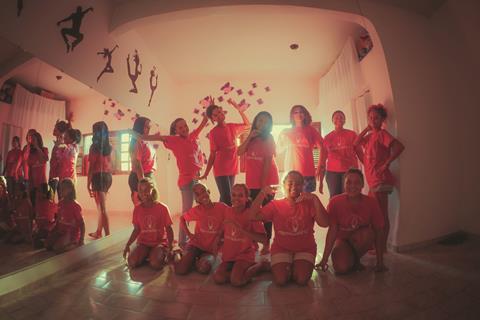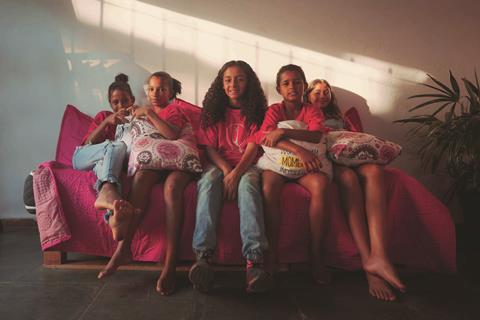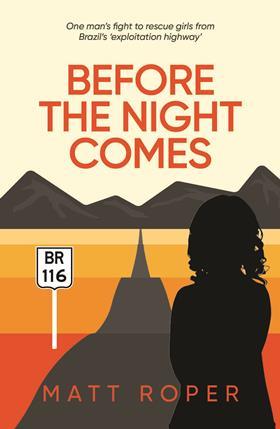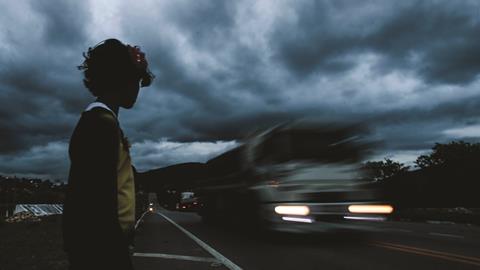When Matt Roper stumbled across an 11 year-old girl selling her body for sex on a Brazilian motorway, it changed his life forever. He tells the shocking story of the road where child exploitation is considered ‘normal’ and his journey to change hearts and minds
As Christmas approached 13 years ago this month, my family and I weren’t hanging the decorations, wrapping presents or browsing the festive markets. We had suddenly found ourselves on another continent, in sweltering temperatures, with all our belongings in a collection of suitcases – and a toddler in tow.
A year earlier I could never have imagined that our next Christmas would be like this – that I would leave everything I knew and the job I loved to move to Brazil with my wife and young son.
As we battled gridlocked traffic searching for a place to live, or waited for hours in queues to get documents we needed, a tree and turkey with all the trimmings was the last thing on our list. But that year was also the most meaningful Christmas of my life. I couldn’t help but be reminded of the first Christmas – Mary and Joseph’s exhausting, chaotic journey to a faraway place, their worry for their unborn child and increasing angst as they frantically searched for a room. I knew what they were going through.
Our journey to Belo Horizonte had begun eleven months earlier. It involved a chance encounter with the worst of human cruelty. And it changed my life in an instant.
What’s a girl worth?
In January 2011, I’d flown to Rio de Janeiro to meet up with a friend. After a few days on the beach, we’d hired a car to explore some of Brazil’s vast backcountry, away from the normal tourist trail. It was the last day of our road trip when, at around 1:20am as we slowed past the outskirts of another remote town, we saw a young girl standing on the side of the motorway.
She looked no older than ten or eleven, and wore a lilac dress and a purple ribbon in her hair. She was painfully alone. We decided to stop to find out if she needed help. But over the next ten minutes we discovered the devastating truth – Leilah, aged eleven, was sent by her own family to the motorway, to sell her body to truck drivers.
“I wait here for the truckers. When I get home, I leave the money on the table. It’s what I do every night,” Leilah told us.
“When the truck driver’s finished, he throws me out of his cabin. Sometimes they let me climb down, or sometimes they just kick me out. That’s how I got these,” she said, showing us the scars on her elbows.
Everything Leilah said during that brief encounter was devastating. She talked matter-of-factly about nights of abuse at the hands of violent men, as if it was completely normal. At one point she told us how much they would pay her: “They try to give me just a few reals, but I never let them pay me less than 25,” she said. That’s around £5. It was all this precious girl thought she was worth.
God sees them, he hears their cries. And he calls on us to respond
The last moments were the most painful of all. Leaving a vulnerable child, who we now knew was in so much danger, on a dark highway went against every instinct we had. “You’re worth much more than you can ever imagine, Leilah,” I told her, tears and anger welling up. “Please don’t do this. You deserve so much more.”
Working on instinct
At this point, I had been working at the Daily Mirror for ten years. I was a hardened news reporter, more than used to hearing about heartache and tragedy, but nothing prepared me for this.
As a journalist, my instinct was to investigate. I’d never heard of children selling their bodies on Brazilian motorways. How many more were there? Why were people driving past without doing anything? It felt like I’d stumbled upon an unreported story that needed to be told. And as a Christian, I felt it was no chance encounter. The more I thought about it, the more convinced I was that I needed to respond.
So began a journey which would lead me deep into a dark world of child sexual exploitation and trafficking few knew existed, and which certainly had never made any news headlines.
Leilah, I discovered, was just one of thousands of girls – some as young as nine – being prostituted along the BR-116, a 2,700-mile road spanning the length of Brazil, known as the ‘exploitation highway’. Many were sold by their own families, often for just a plate of food or a packet of cigarettes.
In the remote towns along the highway, there was no one to tell them differently or offer them a way out. Their communities told them that abuse and sexual exploitation was normal for girls their age.
I later found a Brazilian government survey which identified 262 places along the BR-116 where underage girls could be found for sale. That was, on average, one place every ten miles. The worst stretch of all, known as the ‘child prostitution corridor’, was in the impoverished north of the Brazilian state of Minas Gerais – where my friend and I had met Leilah that night.
Convinced I’d stumbled upon a tragedy that I could only properly investigate in Brazil, I left my job and we moved there at the end of the same year. The plan was to find a flat, settle in and for me to spend the next year documenting the girls’ plight.
But it only took two fact-finding trips to know I should be doing more than just writing. On the second trip, almost all the girls we had met before had gone missing, some presumed dead.
Natiele, aged 14, had been murdered inside a trucker’s cabin. Mariana, 13, had disappeared, rumoured to be in an underage brothel hundreds of miles north. The situation was too urgent; every day could be a day too late. We had to do something.
Pink houses
We started setting up projects in towns along the highway, offering girls a safe place during the day, people who cared for them and could help them find a way out and activities such as dance, which would help them see their true worth and potential. Meninadança, or ‘Girldance’ in Portuguese, became known for its bright pink safe houses.
When we opened our first ‘Pink House’ in the town of Medina, I remember the look of amazement and disbelief on the girls’ faces as they walked around. Everything was different from what they saw and heard outside, from the love and attention they received, to the phrases on the walls: “You are special. You are worthy of your dreams”; the words from Jeremiah 29:11: “I know the plans I have for you…plans to give you hope and a future.”
When they stepped inside the dance room and saw themselves in the mirrors, many immediately ran out. Their self-esteem was so shattered that they couldn’t bear to look at themselves.
But soon, as the girls began to learn to dance, they started to discover their beauty and worth. They reclaimed their bodies which, until then, had been the property of others. For many, it was the first time they felt truly safe or cared for. They began to open up about their traumas and find strength to take back control of their lives.
Today, nearly 14 years after finding Leilah on the side of the highway, Meninadança has five Pink Houses working with more than 500 girls each week in the worst affected towns along the BR-116. We employ more than 60 people, including social workers, psychologists and a team of lawyers.
We have seen God’s miraculous grace and provision, not least in those he has raised up to work alongside us, including the brave local women who work in our Pink Houses, caring for hurting girls who are seen by their own communities as worthless and disposable. We have seen hundreds of girls rescued from abuse and exploitation, and managed to put many of their abusers in jail. But we’ve also faced hostility, retaliation, corruption, setbacks and tragedies. In the towns where we work, trafficking young girls is as lucrative as dealing in drugs or guns.

Made for more
The stories of the girls we have come to know and love have been no less heartbreaking than the first.
One, a 13-year-old called Bia, was made to work in a roadside brothel by her own mother. She was only ten when she was first sent to the motorway. “My mum would beat me if I arrived back without enough money,” she told me. “She’d take it to buy alcohol, but she even made me do it for a can of cooking oil.
“I was still only ten when I got pregnant by a truck driver. I was so young I didn’t even know what being pregnant was.”
Bia started coming to our first Pink House in Medina. The troubled teenager was a handful, and locals warned us she was a lost cause. But today Bia is a member of staff, working as our beauty salon teacher, has a loving partner and is a devoted mum.
She recently wrote: “Just when I thought there was no point in living anymore, the Pink House found me. Today I live a healthy life, I earn my own money with dignity. I’m very thankful to God, because if Meninadança hadn’t entered into my life, I’m sure I wouldn’t be here today. Today I can finally say that I am happy.”
As we got to know the region, it became clear that child prostitution had become ingrained in the local culture. Most people – including those in authority – believed there was nothing wrong with parents using their young daughters to supplement the family income.
At our second Pink House, in Cândido Sales, the mother of one girl even tried to claim compensation from us after her 14-year-old daughter slipped and broke her leg at the house, because while it was in plaster she couldn’t earn the family money at the local brothel.
Another girl, 15-year-old Samara, believed it was normal for every girl to suffer sexual abuse at the hands of their father. In our discussion group, she learned that this was, in fact, a crime and bravely made a police report. Our team supported her as she testified in the first-ever child abuse case in the town’s history. Eventually, her father was jailed for 47 years.
Getting justice changed everything for Samara. Finally able to believe what our team had told her about how much God loved and cared for her, she was baptised later that year. Today, Samara is happily married and a loving mother to her own daughter. Her journey convinced me that we couldn’t bring true healing to girls’ lives without also fighting for them in court.
Other legal battles followed. Julia, aged 13, testified against an abuse ring of outwardly respectable local businessmen – including the local estate agent who we were renting the Pink House from.
We also succeeded in getting a local mayor jailed for 26 years for child abuse. At first the case against him was buried. Justice was only done after our supporters around the world deluged the town’s police chief with letters demanding action.
In Catuji, we filed a lawsuit against the whole town – holding the mayor personally responsible – when they refused to provide a children’s home place for 14-year-old Lara, who was living on the streets, being viciously exploited by drug and prostitution gangs.
It was the first time a town had been forced to protect one of its girls, and today Lara is safe and free from exploitation. “At the Pink House I found my second chance to live”, she wrote to us. “You never gave up trying to find me. I’d already accepted my own death when you rescued me. I’m happy and alive today because of you.”
When I returned to the UK and back to my job on the Mirror in 2019, the project continued under local Brazilian leadership, and our teams of dedicated women still work daily with increasing numbers of vulnerable girls who have nowhere else to turn.

Changing hearts and minds
But for every success we’ve had, we’ve also dealt with senseless tragedies too. Just a few months ago, we were devastated by the brutal murder of 15-year-old Duda. A victim of sex trafficking and slavery, her short life was marked by violence, but she had found freedom and happiness at the Pink House and vowed to be the best mum to her baby daughter, herself a product of rape. It is believed she was shot dead on the orders of the man who had imprisoned her.
These are distressing stories, multiplied thousands of times over along Brazil’s ‘exploitation highway’. Girls who are still lost and alone with no one to turn to. But God sees them and hears their cries, and he calls on us to respond. Our mission is to open more Pink Houses so many more girls can find hope and a new life.
Last year, SADA, one of Brazil’s biggest haulage firms, whose vehicles make up most of the trucks travelling up and down the BR-116, asked us to train their 7,000 truck drivers to be “agents of protection” on the highway. They want to be the answer to the problem, not the cause.
I’d never heard of children selling their bodies on Brazilian motorways. How many more were there?
Perhaps the most incredible moment, however, was seeing three of our girls perform at the Houses of Parliament in London last year. Rany, 13, Moany, 14 and Maluiza, 15, moved people to tears as they told, through dance, the story of so many girls who had been robbed of their childhoods on the motorway yet, against the odds, found hope and new life.
Girls like Leilah, whose plight once went unnoticed and their cries for help unanswered, were finally being seen and heard.

Before The Night Comes by Matt Roper (Mirror Books) is available now



































No comments yet